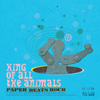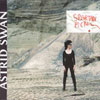Label: Pyramid
Viewing posts
1-5 out of
5
9
Kiki Pau are an elusive beast. I hear elements of "London calling"-era Clash, especially the appreciation of old-school ska and reggae, and the Kooks' songwriting in "Bobby Marley"; rockabilly and indie frameworks ensnarl themselves around angular, playful guitar work akin to that of Franz Ferdinand in "Your bedroom"; the opening of "Poses" reminds me of The Smiths' "Rusholme ruffians", only to evoke much more contemporary British references in the verse and chorus; the break in "Chronic puberty" pays skillful homage to the Beach Boys; and "Berlin" brings to mind Razorlight and Longwave. Pair this ability to freely, mischievously wheel all through the indie rock (80s, 90s, and contemporary), swing, and rockabilly genres (just to name a few) with strong, clever vocals, references to Steinbeck (in a song titled "Bukowski"), and you have a fantastic record that's made all the stronger by its complicated relationship with both melancholy and summery pop, seemingly unable to deal with one without the other.
- Lars Garvey Laing-Peterson
8
I've always held a soft spot in my heart for Tigerbombs, mostly as a damned fun summer band, though Pepe Trouble's solo act took me by surprise: not only in solidifying his songwriting amongst the strongest summer-pop work out there, but also by branching out his pop craftsmanship along more serious avenues. With a truly all-star Scandinavian cast, including Astrid Swan, Samae Koskinen (of Sister Flo), and Sweden's The Mopeds, amongst many, many others, King of All the Animals is a talented collection of tried and tested musicians, and "Paper beats rocks" is even further testament to this statement. Instead of the Caesars (Palace)-like tact that Tigerbombs adopt -- chock full of rock organ hooks and fills -- King of All the Animals is a much more typically Scandinavian pop group. "1000-mile-heartache" feels like it fell straight out of a 80s coming-of-age film, a Modern English vibe wrapped around an almost Shout Out Louds-type delivery. "Everything burns red" bristles with perfect guitar hooks and the layered, saturated approach that Moonbabies have perfected. There are a few stumbles on the record, all of which are easily forgiven (and almost more easily forgotten as one become more familiar with the album), and none of which even mildly threaten to derail this proficient and entertaining work. Listen to "The Cologne beat" and you'll know exactly where all my excitement for "Paper beats rock" comes from.
- Lars Garvey Laing-Peterson
8
Like a dizzying, drunken sprawl across the deck of a flailing sea vessel, "Spartan picnic" gives you little time to get your bearings before bombarding you with a varied range of genre choices and idiosyncratic deliveries. Astrid Swan seems just as comfortable in the 4/4, straight-forward chorus of the title track of her album as she does with the stuttering, shifting landscape of the rest of the song - and this extends throughout the record. "For those who drown" is a Billy Joel-esque anthem that was directed drastically off course, slipping through the electronica of the 80s and the kitsch of 70s rock ballads, and somehow coming out a winner... don't ask me how. The waltzing "Kinda joke" plays up the burlesque feel of "Spartan picnic", allying these theatrics with an almost "Sgt. Pepper's..." circus of oddities and the current trend towards quirky indie-rock. "What does the pink mean" has slowly become one of my favorite songs released this year: at first masquerading as a calmer, more accessible singer-songwriter's composition, but building itself up through so many torn shrouds of layered instrumentation that it becomes hard to call this track, or any of Astrid Swan's songs, a normal expedition. This album, rather obviously, is not going to be everyone's cup of tea. It is however, in this reviewer's humble opinion, a bizarre vehicle that is well worth its blessed confusion.
- Lars Garvey Laing-Peterson
7
Film snobs seem incapable of having a good time during fun, blockbuster films. I have friends that refuse to read anything except 'classics' or 'cult novels'. Hell, I'm not deluded enough to be unaware of the fact that I only mention certain films, texts, and music when I am trying to impress someone. But there is a place in this world for uncomplicated entertainment, there's only so many times a year that I can have life-changing realizations and pause for the subsequent self-evaluation, and Tigerbombs fills this niche very competently. Obviously influenced by party jam artistes Ceasers, and helped in their quest by Paola on a few songs, the Tigerbombs' "Things that go boom" is everything that a garage-pop album should be – entertaining, energetic and solid. The songs are very well put together, there's a lot to be said about bands who can consistently craft a three-minute pop song, and even have nice surprising elements, like the wonderful ending of "Hit the lights" that bleeds perfectly into "The winter's gone today". It's summer, you deserve some fun. Tigerbombs want to help.
- Lars Garvey Laing-Peterson
Avi described this band as "like the Caesars, only Finnish" and frankly I'm having a hard time coming up with a better snappy summary of this duo's second full length release. Like their aforenamed Swedish brethren, Tigerbombs (not to be confused with British band Tigerbomb) play short catchy pop songs influenced by 60s garage rock, heavy on the organs. They describe the record as more like adolescence than adulthood, and it does brim with teenage punk energy (think Buzzcocks or Undertones). It's an innocuous enough record - fun, catchy, energetic -- but ultimately the songs do a better job of suggesting the pop classics they could be than they do of achieving that perfection. Still, it's a nice release, and I wouldn't be surprised if they sharpened up their song writing and put out a brilliant fourth or fifth record one of these days.
- Nancy Baym
 Kiki Pau
Kiki Pau King of All the Animals
King of All the Animals Astrid Swan
Astrid Swan